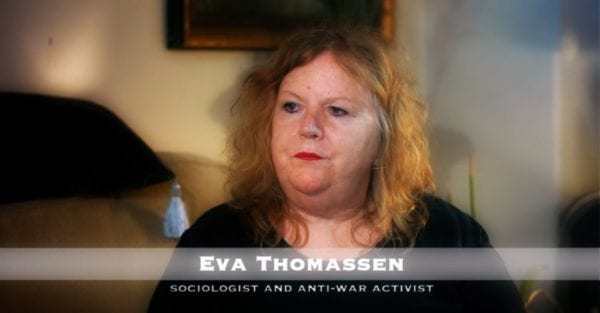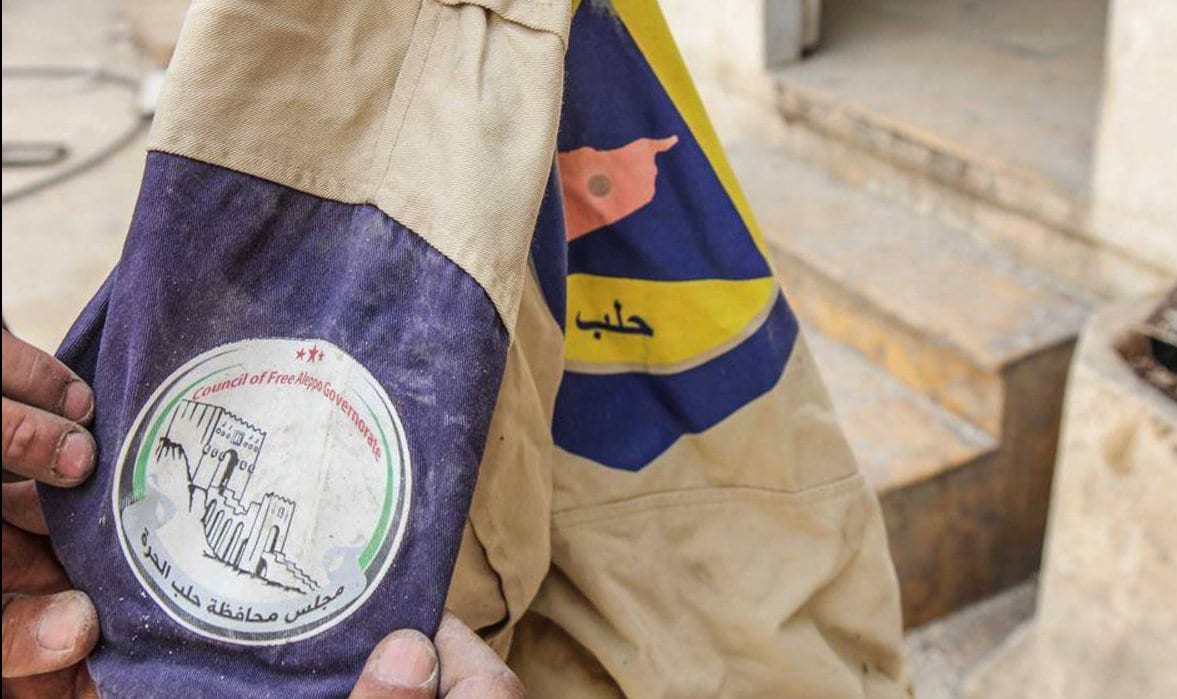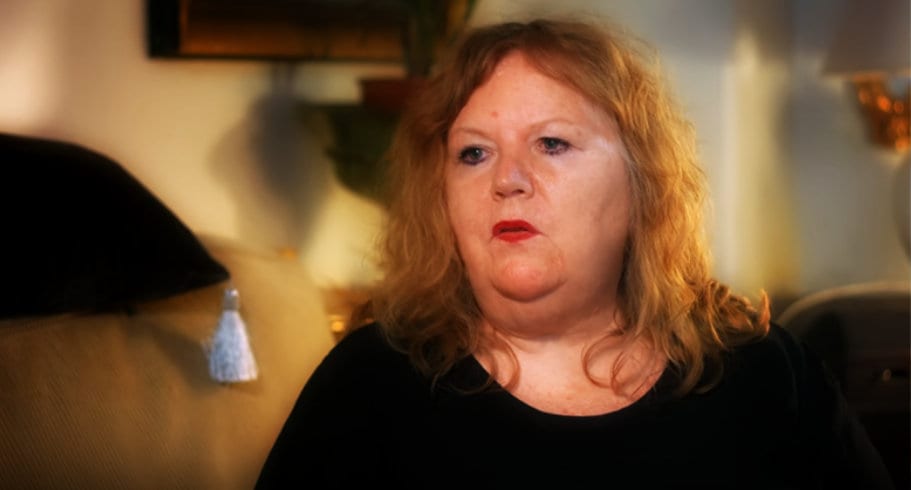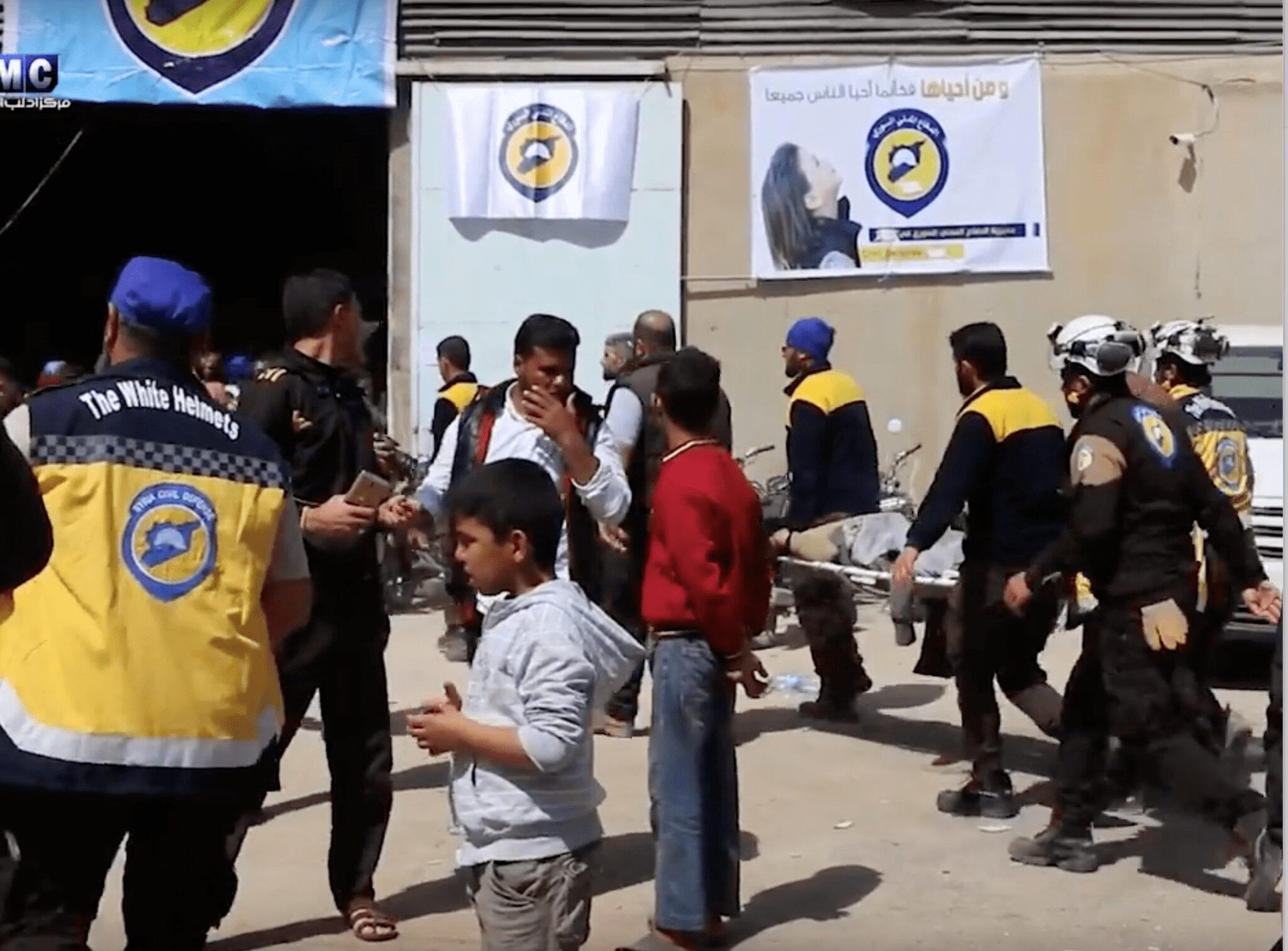Interview with Eva Thomassen, Norway’s only war reporter in Syria: At The Herland Report, we strive to acquire knowledge about all sides in a conflict, here the Syria war.
What has angered many in the West is the biased and one-sided coverage of the Syria war in the mainstream media.

Is the media no more than a propaganda channel for the military complex in the geopolitical struggle to own world oil?
We need journalists who are critical, who examine a variety of perspectives in conflicts that are among the worst the world has ever seen.
The Syria war led to over 10 million displaced, hundreds of thousands killed and is the worst humanitarian catastrophe since World War II. The conflict deserves to be examined from a variety of angles, here war reporter Eva Thomassen tells her story.
The Herland Report therefore has the pleasure of publishing an exclusive interview with sociologist and Norway’s only reporter from the war zone in Syria, sociologist Eva Thomassen. Watch one of our TV interviews with Thomassen here.
She has been travelling in and out of Syria for several years; she has been on the front lines and conversed with soldiers, doctors, foreign ministers, generals and regular people on the street.
She was in Aleppo right after the rebel forces lost the Battle of Aleppo; she witnessed with her own eyes how Islamists and women covered from head to toe boarded the buses that took the rebels and their families from East Aleppo to Idlib, which is now world known as an al-Qaeda lair. Thomassen states:
“Those of us who defy the travel warnings from our governments have the chance to speak with regular Syrians in Syria. That’s quite something, since we do not hear their voice at all in the Western media.”
“We get to spend weeks with these people, listening to their view and impressions of what is really going on, seen from their angle. Especially since we hear nothing about their view in our mainstream media, I found their stories interesting. They should be covered too, so that the complexity in the region may be displayed to a Western audience, not only the “politically correct” Western version.”
“I find these stories important, because the whole concept of Western journalism has been to examine facts from different angles. We don’t do this much anymore, as the very few own the media, but this is still a vital excercise for those who wish to report from several angles in a military conflict.”

Thomassen visited Syria once again in the wake of another battle lost by the same rebel groups for a strategic area, namely Eastern Ghouta. (Feature photo: The Norwegian Armed Forces) Watch the latest Herland Report TV program with Thomassen here.
![]() The Herland Report: – You’ve visited Syria again. It’s not the first time—you’ve lived in Syria, worked there and travelled in and out of the country in the midst of the ongoing war. It’s utterly remarkable that little, internationally insignificant Norway has a Norwegian war reporter on the ground in Syria in the mindst of war. And you have first hand experience from this battlefield.
The Herland Report: – You’ve visited Syria again. It’s not the first time—you’ve lived in Syria, worked there and travelled in and out of the country in the midst of the ongoing war. It’s utterly remarkable that little, internationally insignificant Norway has a Norwegian war reporter on the ground in Syria in the mindst of war. And you have first hand experience from this battlefield.
Sociologist and war reporter, Eva Thomassen: – I’m one of the people who the Norwegian Ministry of Foreign Affairs (MFA) has advised against travelling to Syria. The MFA can’t provide consular assistance, they say. But do I really need it? No. Why not?
Because I’m protected by the Syrian government. It’s that simple. Our hotel was swarming with church leaders from the U.S. and the U.K., peace activists from all over the world, independent journalists from France and Canada, an archaeological delegation from Italy and an involved lady from Switzerland.
Her brother is from Ireland. Three from Norway. Many Westerners are in Syria, the media just doesn’t speak about it.
All of us were advised by our respective governments against travelling to Syria.
The MFA’s travel advisory for Syria states that “the highly unstable security environment in Syria has significantly raised the risk of danger for Norwegian citizens. The Norwegian Ministry of Foreign Affairs advises against all travel and stays in Syria. Norwegians in Syria are urged to leave the country. The Norwegian government’s ability to provide consular assistance in Syria is extremely limited”.

All of our countries are “Friends of Syria” participants. Most of the hotel guests have been in Syria on many occasions.
This is my fifth visit since 2015. What is it that makes us so fearless that we dare to travel to Syria?
Haven’t we heard that foreigners have been kidnapped and killed in government-controlled areas? Why should we be given less protection than a Syrian citizen just because we aren’t from Syria?
RELATED ARTICLES:
- How to create Revolutions and overthrow governments #Serbia, Libya, Syria – Joaquin Flores.
- White Helmets bedrageriet “Last Men in Aleppo” – Eva Thomassen
- Høstens serie: Lever vi i folkestyre eller i oligarki? – Hanne Nabintu.
- Faktafeil fra Faktisk.no: Norge, Al Qaida og Syria, Eva Thomassen.
Do like thousands of others, subscribe to The Herland Report newsletter here! Thanks so much for reading. More people, like you, are supporting and reading our investigative work, than ever before. All articles are free, no pay walls. The best way to make sure you see what we publish is to subscribe to the mailing list, which will get you a weekly email notification and alerts about our TV shows – FOR FREE! Follow the trend and subscribe!
Interview with Eva Thomassen, Norway’s only war reporter in Syria: Those of us who defy the travel warnings from our governments have the chance to speak with the Syrians in Syria.
That’s quite something, since we do not hear their voice at all in the Western media. We get to spend weeks with these people, listening to their view and impressions of what is really going on, seen from their angle. Especially since we hear nothing about their view in our mainstream media, I found their stories interesting.
They should be covered too, so that the complexity in the region may be displayed to a Western audience, not only the “politically correct” Western version.
I find these stories important, because the whole concept of Western journalism has been to examine facts from different angles.
We don’t do this much anymore, as the very few own the media, but this is still a vital excersize for those who wish to report from several angles in a military conflict.
We cannot only speak to Syrian exiles who speak on behalf of all Syrians, but haven’t even been to Syria in 30 years. There needs to be a willingness to examine all the facts, not only the view points of those that are close to the American forces.
Yet, our governments take the Syrian exile’ viewpoints as “the only legitimate”. It seems that our media only listens to those Syrians who wish to cause the fall of President Assad. Other Syrians who are widely accepted in the West are so-called refugees.
Exile Syrians are also diverse, “everybody” has been “tortured”, “imprisoned” or knows someone who has been killed.
This has been the oddly concurrent narrative from just about everyone. Everyone is at a combative age and comes from areas controlled by terrorist groups. They don’t support President Assad, so they support terrorist groups if not militarily, then ideologically.
These are deemed by European leaders often to be dangerous group for Europe. When you see how easy it is to recruit jihadists to travel to Syria and join terrorist groups, this contingent of Syrians poses a security threat to Europe.

Sociologist and war reporter, Eva Thomassen: – Norway shut down its embassy in Damascus in 2013. Norway’s allies did the same. Along with all of the countries that were participants in “Friends of Syria”. It was an intentional, political act. I
solating Syria from Western countries was part of the West’s agenda. The West also refused Syrian officials entry into countries that were party to “Friends of Syria”.
In other words, there are no high-level diplomatic relations between Norway and Syria. The closest embassy is in Beirut. Norway hasn’t cut diplomatic ties with Syria on paper.
But Norway recognizes the “National Coalition” as the “lawful representative of the Syrian people” (2012). The National Coalition is a rough-and-tumble bunch of Syrian exiles who all want to return home to Syria, but not until the country has been laid to waste.
Norway has tried to fulfil this wish since as early as 2011. The Norwegian People’s Aid, the Norwegian Refugee Council, Save the Children Norway, Norwegian Church Aid, Doctors Without Borders and NORWAC are not being advised against travelling to Syria.
In fact, they receive billions of kroner in cash from none other than the MFA when they go into Syria. Is the MFA able to provide consular support to these organizations?
My understanding from what most of the Syrians I talk to on my visits to the country tell me, is that for them it’s a fight to survive as a secular state.
They see the geopolitical shadow cast by the big, international actors with interests in Syria. They see it all the time, but they’re still just regular people that can’t do much about the international power struggles over who will “own” and “rule” the Middle East.
These power struggles must surely have always been there. It’s more so the religious battle that most Syrians fear; they fear religious extremism.
It is indeed religion that is the glue that holds the Middle East together, and exploiting religion is nothing new. It’s happening in practically every country in the Middle East. From the extreme Wahhabism in Saudi Arabia, to the equally extreme Wahhabism in Turkey, disguised in a suit and a presidential election.
RELATED ARTICLES:
- Lies on Syria: Médecins Sans Frontières only reprint White Helmets – Tim Hayward.
- Swedish Doctors for Human Rights: White Helmets Macabre Manipulation of Dead Children in Staged Chemical Attack, Syria.
- Shocking scandal if Al-Nusra affiliated White Helmets are awarded Nobel.
- Norwegian aid used to help al-Qaeda groups in Syria?
Interview with Eva Thomassen, Norway’s only war reporter in Syria: The Muslim Brotherhood is banned in Syria.
If it weren’t for Turkish President Erdogan’s tentacles—a president who is considered in the region to be a member of the Muslim Brotherhood—this uprising could have been stopped before it started.
In 2011, Erdogan offered to help Assad rein in the rebellion if Assad appointed six ministers to the government from the Muslim Brotherhood.
Assad declined; he wanted to keep a secular form of government for Syria and didn’t want to go in the Islamist direction that the Muslim Brotherhood represents.

![]() Hanne Nabintu Herland: – There notably are very few Western journalists on the ground in Syria. Even the relief organisations that “report on the ground” appear not to have their own people there, but instead just regurgitate to the West whatever the White Helmets or the representatives of various rebel groups say.
Hanne Nabintu Herland: – There notably are very few Western journalists on the ground in Syria. Even the relief organisations that “report on the ground” appear not to have their own people there, but instead just regurgitate to the West whatever the White Helmets or the representatives of various rebel groups say.
What’s unique about you, Eva Thomassen, is that you actually travel in and out of Syria quite often, and thereby represent a kind of witness of the truth which is completely new in the Western sense.
Sociologist and war reporter, Eva Thomassen: – Syria is a battlefield, but not a heap of rubble. In the West we never hear about the Syrian civil society and how every part of the Syrian society works.
A major trade union conference was recently held with representatives from Norway, among other countries. Delegations are constantly coming from countries that wish to establish partnerships within a number of areas.
Many Syrian exiles that haven’t left the country because they disliked their government’s policies, but rather conducted business outside of Syria, are now returning with high-level, specialist expertise and rebuilding the country.
Syrian engineers from the Gulf states are involved in major construction projects to establish new residential areas. Syria has started producing its own medicine again.
Educational facilities and trauma treatment programmes are being established for children from areas that have been controlled by terrorist groups such as in Eastern Ghouta and Douma.
We mustn’t forget that all of the evacuees from areas liberated by the Syrian army are protected by the Syrian government.
It’s terribly costly, and as we know, the Syrian government receives no aid from Western countries in the form of money, expertise or funds for rebuilding infrastructure. It’s evidenced in the sanctions from the U.S. and EU, which Norway supports, that every single sector must be sealed tight to prevent loopholes in the sanctions.
Syria is now seeing who is friend and who is foe—both inside and outside of the country. In that respect, despite its atrocities, this war has made Syria more aware of the country’s multireligious and ethnic identity.
This can be seen especially in the Syrian army. I asked one Syrian whether the soldiers would fight just as hard if they didn’t have a religion to lean on. If death did matter.
If being a martyr didn’t come with a badge of honour. The response I got was a reflection of this fight.
Interview with Eva Thomassen, Norway’s only war reporter in Syria.
This is a fight for the nation state of Syria. After speaking with regular people, my understanding is that to regular Syrians, it’s not about religion.
Religion—or the extremist version of Islam that many in Syria say is not Islam at all, but a crude perversion of the religion—means a lot to the Sunni extremists in terrorist groups.
They’re not really concerned with life here on earth. Here, murder and money is their reward. Death is also a reward.
They have a completely different perspective on life and death than we do. Taking as many people with them to the grave as possible is a bonus. They are trained to think this way and are told that this is true Islam. To make it to paradise with the 72 virgins, although the Quran even forbids for a Muslim to take his own life.
This is why it’s so difficult for the Syrian government to negotiate with these terrorists. They’re not interested in surviving themselves, nor are they interested in the welfare of society.
The amnesty policy that the Assad regime is practising is therefore ingenious, yet complex.
Giving terrorists the option to either put down their weapons and receive amnesty, or take their weapons and families to Idlib.
It’s a method that Assad uses where instead of having government soldiers kill all of the terrorists when they lose a battle in an area such as Raqqa or Dhouma, they are given the opportunity to leave together with their families.

Hence the buses to Idlib that NGOs supported by the West also travel on when leaving an area over which the battle was won by the government forces. Ergo the agreement with the Syrian state where they won’t be arrested or receive the death penalty. You are allowed to leave the area.
Many of the rebels are said to join the government forces and become one of them. Those who don’t want to are shipped off to Idlib where al-Qaeda rules for the most part. There are also Norwegian-supported NGOs there, to which Norway sends billions in aid.
The Syrian government knows this full well, but they allow it. They essentially give them a way out. The Syrian government is not concerned with taking revenge—nor are the Syrian people. They are more interested in salvaging their nation state.
![]() Hanne Nabintu Herland: – The amnesty system worked well in the Aleppo situation too, when the rebels and terrorists were also shipped off after the government forces took back East Aleppo. You wrote about that too, and were in Aleppo right after its fall, Eva.
Hanne Nabintu Herland: – The amnesty system worked well in the Aleppo situation too, when the rebels and terrorists were also shipped off after the government forces took back East Aleppo. You wrote about that too, and were in Aleppo right after its fall, Eva.
War reporter and sociologist, Eva Thomassen: – Yes, and there certainly has always been war in Syria or in its neighbouring countries. At least after the fall of the Ottoman Empire in the early 1900s.
That was when all of these countries were carved up into nation states. The British headed this.
Even so, I find Syria to be a safe and peaceful country, despite the brutality of the terrorists. Terrorists with whom very few people identify. This extreme version of Sunni Islam does not have the footing in Syria that it does in states like Saudi Arabia or Turkey.
Syria is a country with good old-fashioned socialism as its system of government. Syrians know what imperialism is—what values, friends and history are. They know who they can trust.
Syria also has a social democratic welfare system integrated into everything from the state to the individual. Syrians are surviving now because family and friendship are in their genes. For example, you won’t find beggars in Syria.

![]() Hanne Nabintu Herland: – Syria is the country that receives the most aid from Norway. Billions are funnelled into the country. You have spoken out critically about where the money ends up for a long time now.
Hanne Nabintu Herland: – Syria is the country that receives the most aid from Norway. Billions are funnelled into the country. You have spoken out critically about where the money ends up for a long time now.
As someone who grew up in Africa, I’ve followed the national debates and seen the pervasive corruption going on there, to where in case after case, Norwegian aid actually ends up in the pockets of entirely different people than the poverty-stricken children.
Eva Thomassen: – The same problem in Syria is surely present in many other countries—when Norway “gives” 3.4 billion kroner to Syria, it’s given only to fragments of the country. It’s not given to the public sector in Syria, but only to groups defined as the “opposition”.
Unfortunately for Norway, this translates to terrorist groups in areas controlled by terrorist groups. Almost all of the terrorists across Syria have been bussed to Idlib.
All Norwegian and Western NGOs are also there. Every time they lose military battles in an area such as Ghouta, the losing side—the opposition groups that have fought against the government forces there—is shipped off to Idlib, which, incidentally, is known the world over as an al-Qaeda lair.
I’ve talked about this before—how these Saudi-backed mercenaries, terrorists or rebels ride on the same buses that the Norwegian and Western-backed NGOs take.
Much of what we engage in does not bear close scrutiny.
There is nothing to suggest that non-Norwegian relief organisations do the same thing in areas where they operate. It’s beyond all doubt that there are terrorist groups controlling the border crossing points from Turkey, Iraq and Jordan into Syria.
Norwegian NGOs always ride along with the terrorist groups in the green buses that leave any area liberated by the Syrian army.

There’s not a single roundabout in Idlib that isn’t controlled by terrorist groups or that doesn’t require you to pay the terrorist groups a “toll”.
The Hawala system, which every relief organisation uses to funnel billions in cash into Syria, functions through a network of couriers, each of whom gets their cut of Norwegian tax money in return for conveying billions into rebel-controlled areas.
I was in Syria this past April, right after Eastern Ghouta was liberated. 40,000 terrorists were sent to Idlib from Eastern Ghouta.
All of the NGOs from Western countries stood at the ready to receive these terrorists with excellent medical services, food, luggage carriers and anything a terrorist could ever ask for.
Here the terrorists were placed on stretchers and admitted to field hospitals belonging to major international NGOs such as the Syrian American Medical Society (SAMS), UOSSM, the White Helmets, Doctors Without Borders and a number of local NGOs acting as local representatives for the Norwegian People’s Aid, the Norwegian Refugee Council, Save the Children Norway and NORWAC.
![]() Hanne Nabintu Herland: – May I just cut in and add that the same is the case with so many African countries. The aid we have been providing for all these years does not bear close scrutiny either. Just look at South Sudan—the Norwegian contributions there have gone to actively supporting a local conflict that resulted in civil war.
Hanne Nabintu Herland: – May I just cut in and add that the same is the case with so many African countries. The aid we have been providing for all these years does not bear close scrutiny either. Just look at South Sudan—the Norwegian contributions there have gone to actively supporting a local conflict that resulted in civil war.
Eva Thomassen: – I’m not an expert on Africa, but I believe there to be parallels here. Many so-called third world countries have went through processes that follow a particular course. When you’ve lived in a country for a long period of time, you slowly learn about the deeper cultural processes or the social processes, and you then understand more about what the people really think of a great many things.
Eva Thomassen: – What we are witnessing today in Syria is a world war. The NATO countries are militarily involved in the conflict.
All of the Gulf states, Israel. All of the proxy armies. They’re composed of mercenaries from more than 100 countries. No one anticipated how difficult it would be to control President Assad. They thought it would take a couple of months. But Clinton, Erdogan and Israel had it all wrong.
Sure, the war is about oil, but most of all it’s about Israel and the U.S. wanting to crush the “axis of resistance” that is Iran, Iraq, Syria and Lebanon, otherwise termed Hezbollah. Then Russia too will be brought to its knees.
Erdogan has his own dreams of bringing Syria under his reign as a superpower. In a meeting we had with President Assad’s political advisor, Bouthaina Shaaban, in April of 2017, she offered frightening words of caution about how dangerous Erdogan is. He’s a danger to Europe as well. It’s said that Erdogan is Europe’s export-grade version of Wahhabism. Turkey is indeed part of NATO—part of Europe. She likened him to Hitler.
As a political leader, President Assad is no joy for the West to have to deal with. He knows the story of Syria, he’s his father’s son and he won’t be the U.S.’ lapdog. Syria has no foreign debt, it’s self sufficient with food and exports oil, gas etc.
The parliament, government and local administrations all around Syria work as usual to manage the society like we do in Norway, for example.
At the same time, they compensate for sanctions by establishing oil refineries, for example, which don’t rely on components subject to sanctions. Syria recently received tonnes of humanitarian aid—school materials from India.
Even after the deadly sanctions it has been placed under by the West, Syria still continues to survive. This is correlated to Syria’s lack of dependence on the Western economy and trade. Norway wouldn’t last long before running out of food and other goods. We’re nearly 100% dependent on foreign goods and services.
Everyone asks those of us who travel to Syria to ask the people why Assad receives so much of their support. The answer is plain and simple. He hasn’t given up on his people.
He hasn’t run out on them. He stays and supports his people in their fight against clearly defined enemies—and the majority of Syrians know who these enemies are. They see him as one of them—a brother, a father.
They also see how the extremist version of Wahhabism has consumed the country and provoked the ideology among that part of the population, and how Assad fights to keep Syria from meeting its end as a secular state.
The level of censorship in social media and search engines is all-time high. Do like thousands of others, subscribe to The Herland Report newsletter here!
Led by Scandinavian bestselling author, Hanne Nabintu Herland, The Herland Report news and opinion website provides independent analysis from leading Western intellectuals and ground breaking YouTube interviews, cutting through the mainstream media rhetoric. It is a great place to watch interviews and read the articles of leading intellectuals, thought leaders, authors and activists from across the political spectrum. The Herland Report believes in freedom of speech and its editorial policy resides above the traditional Left vs Right paradigm which we believe has lost its relevance and ability to describe the current driving forces in Western politics.









